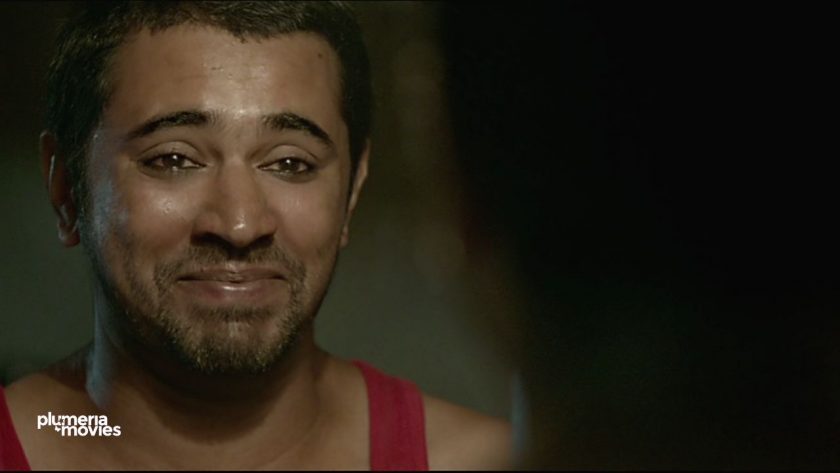In the opening shots of Geetu Mohandas’ debut film, “Liar’s Dice,” a mysterious man flees into the snowy landscapes of the Himalayan villages, leaving behind a trail of deep footprints. As he anxiously runs towards an unknown destination, his presence becomes an integral part of a woman’s quest to find her missing husband, Harud, a migrant laborer whose whereabouts have remained a mystery to his family for five months.
A Continuation of Search and Escape: Geetu Mohandas’ “Moothon”
Geetu Mohandas’ sophomore feature, “Moothon,” commences with a similar theme of search and escape. Along the shores of an island in Lakshadweep, the air is filled with the gentle notes of a brother’s lullaby. Mulla dreams of leaving the island to find her elder brother, who departed long ago, becoming a mythical figure shrouded in rumors and tales of heartbreak. Both films masterfully depict the characters’ innocent anticipation, anguish, and the relentless search for lost connections.
A Journey of Terrors and Tragedy: Mohandas’ Powerful Narratives
Immersing viewers in intense emotions, Geetu Mohandas’ films, “Liar’s Dice” and “Moothon,” skillfully chronicle the terror, pain, and tragedy associated with loss. The captivating storytelling and poignant exploration of human connections make these films exceptional in their portrayal of the complexities of life’s journeys.

Divergent Tones: Contrasting Narratives of “Liar’s Dice” and “Moothon”
While both films share the directorial brilliance of Geetu Mohandas, they diverge significantly in tone and storytelling. “Liar’s Dice,” a National award-winner, unfolds as a contemplative road movie and India’s official entry for the 87th Academy Awards. On the other hand, “Moothon” (2019) seamlessly blends elements of noir and romance, creating a unique cinematic experience. Despite their differences, these films share spiritual connections through their poignant exploration of parallel themes.
Geetu Mohandas’ Melancholic Searchers: A Unifying Thread
In both films, Geetu Mohandas crafts characters who embark on journeys from idyllic, isolated villages to unfamiliar cities in pursuit of their lost loved ones. Kamala, portrayed by the resolute Geetanjali Thapa, and her daughter Manya leave the serene village of Chitkul on a cold night, determined to find Kamala’s missing husband in Shimla. Simultaneously, Mulla, brilliantly portrayed by Sanjana Dipu, escapes her stifling island village to seek her brother Moothon in Mumbai. The characters’ undaunted bravery and naive optimism create a fierce hope that drives them forward despite the silent, aching anguish of their losses.
Perseverance in Hope: Love Amidst Desperation
Kamala and Mulla face insidious challenges on their journeys, where the closer they come to their lost ones, the more elusive their reunions become. The optimism and unbridled hope fueling their searches reflect a profound love that resonates with viewers. As we join them in their pursuit, the films instill in us a shared sense of hope, love, and search, only to be emotionally shattered by the inevitable losses they encounter along the way. Geetu Mohandas’ storytelling prowess weaves a tapestry of melancholy, perseverance, and the indomitable human spirit in these captivating narratives.

Nawazuddin Siddiqui’s Enigmatic Portrayal in “Liar’s Dice”
In the cinematic masterpiece “Liar’s Dice,” Nawazuddin Siddiqui delivers a performance steeped in both frightening mystery and poignant goodness. His character, a baffling stranger, occupies a unique space, teetering between odd endearment and elusive enigma. Siddiqui’s portrayal seamlessly transitions between roles – from a swindler to an unexpected savior, a reliable companion to Kamala in her relentless quest for Harud.
A Companion with Shifting Shades
Siddiqui’s character is a study in duality, shifting constantly between being a protective and noble friend to transforming into an unreliable, exploitative robber. This complex interplay of traits adds layers to the narrative, keeping the audience on the edge of their seats. The character’s elusive nature mirrors the overarching theme of search and survival that permeates the film.
A Search for Survival and Familial Connection
The mysterious companion is not immune to the search that defines the film’s characters. His quest is one of survival and the pursuit of a semblance of home and family. Revealed through an old photograph in his wallet, his backstory unfolds, providing insight into his attachment to Kamala, Manya, and even their goat. Despite his enigmatic nature, he develops an intimate connection with them, rooted in a peculiar sense of familial bonds.
A Deserter’s Silent Bond
A brief glimpse into his past reveals that he is a deserter from the Indo-China border security force, unable to return home to his family. This revelation adds a poignant layer to his character, as the film’s searchers, each lost in their own way, form a silent yet robust bond. Together, they create an unconventional family born out of shared loss and collective drift, navigating the complexities of their intertwined journeys.

The Strangers-to-Family Dynamic in “Liar’s Dice” and “Moothon”
In Geetu Mohandas’ cinematic realm, the theme of strangers finding an unconventional family binds the narratives of “Liar’s Dice” and “Moothon.” However, the stark contrast between these films lies in the woeful drama that unfolds, revealing the poignant struggles of characters navigating their tumultuous journeys.
Unconventional Bonds in “Liar’s Dice”
In “Liar’s Dice,” strangers converge to form an unexpected familial connection amidst their individual searches. The gut-wrenching tale revolves around the disappearance of Harud, an untold story that unveils a harrowing sense of loss, injustice, and dehumanizing indifference towards countless nameless migrant workers. Kamala’s anguished cries echo through the cold city nights, underscoring the film’s dedication to those lost in anonymity.
Siblings as Strangers in “Moothon”
Contrastingly, “Moothon” delves into the heart-wrenching dynamics between siblings who, in their quest for connection, find themselves as strangers. Mulla’s elder brother, Moothon, transforms into a villainous stranger in the gritty alleys of Kamathipura, embodying the harsh realities of Mumbai’s underbelly. The poignant irony unfolds as Mulla, new to the city, hears her brother’s animal-like groans from a prison, terrified and yearning to return home.
Bhai’s Scarred Existence
Moothon, known as Bhai in Kamathipura, is a haunting specter of his past, marked by bleary, bloodshot eyes devoid of warmth. Engaged in ruthless survival tactics, Bhai is a small-time goon haunted by the ruins of Akbar’s scarred history. The film’s narrative pierces through the harshness of Mumbai’s buzzing city life, depicting the agonizing struggles of lost souls grappling with their fractured identities.
Deafening Cries in the Cold City
As Kamala’s cries resonate through the unforgiving nights, the bustling city remains indifferent to the pain and struggles of those entangled in the labyrinth of survival. “Liar’s Dice” and “Moothon” navigate the complexities of human connection, portraying the resilience of individuals in the face of adversity, loss, and the relentless pursuit of belonging in a world that often remains cold and unresponsive.

A Tale of Unforgettable Love and Lingering Loss in “Moothon”
Echoes of “Salaam Bombay” with a Touch of Refinement
While “Moothon” echoes shades of Mira Nair’s “Salaam Bombay,” one wishes for a more refined and stirring portrayal of certain aspects, particularly the central romance. However, the film masterfully employs the flashback narration, seamlessly cutting through the present with sublime and tragically impactful storytelling. The past becomes a poignant center, casting a haunting shadow over the lives of Mulla and her Moothon in present-day Mumbai.
A Present Halved by a Heartbreaking Past
The film intricately weaves the lives of Mulla and Moothon, their dreams and losses, through the lens of a past that aches with irretrievable longing. The present is halved by the weight of this heartbreaking past, creating a narrative depth that resonates with emotional intensity.
Unraveling the Love Story of Ameer and Akbar
The character of Bhai, toughened and bereaved in the present, unravels as a sensitive and beaming lover in his youth. The film delves into the love story of Ameer and Akbar, a love that unfolds gently beneath the moonlight on an island village. Nivin Pauly as Akbar and Roshan Mathew as Ameer deliver unforgettable performances, brimming with love, agony, anger, and frustration.
Akbar’s Silent Search and Bombay’s Thundering Echo
In “Moothon,” Akbar’s search for his lost lover becomes as crucial as Mulla’s quest. Fleeing to Bombay in pursuit of lost dreams, the film shrouds Akbar’s past in mystery and implication, compelling the audience to imagine the pain and heart-wrenching loss. Bombay, in Akbar’s eyes, is not the serene city of Ameer’s dreams; it’s a thundering metropolis, vehement and vengeful, echoing the tumultuous emotions within Akbar’s silenced heart.
A Compelling Narrative of Love and Longing
“Moothon” weaves a compelling narrative of love, loss, and the enduring impact of a past that refuses to be forgotten. With its evocative storytelling and powerful performances, the film explores the intricate tapestry of human emotions against the backdrop of Mumbai’s bustling cityscape.

Lost Lives and Lingering Shadows in the Heart of Mumbai
Amina’s Transformed Life: A Glimpse of Distant Dreams
The city of Mumbai has woven a tapestry of transformed lives, and Amina, Ameer’s sister, is no exception. Now a dancer in her husband’s bar, Amina’s life reflects the altered reality of those seeking freedom and escape. The distant skyscrapers of Bombay are only glimpsed through the window grills of Bhai’s cramped dwelling, emphasizing the elusive nature of dreams in the bustling metropolis.
Unseen Realms: A City Through Taxi Windows
In a poignant moment, trans women guide Mulla through the city in a crowded taxi, pointing toward the glamorous part where film stars reside. However, the camera remains within the taxi, symbolizing the unseen realms and unfulfilled aspirations of the characters. The shadows of the past and the pain of lost love haunt Mulla and Moothon as they navigate a life marred by loss and grief.
Innocence Lost: Symbolism of Goats in Two Tales
The goats in “Liar’s Dice” and “Moothon” become poignant symbols of innocence lost. In both stories, the characters choose to carry the goats, despite the hindrance, signifying the preservation of intimate attachments and the refusal to sever ties. The goats serve as metaphors for the enduring bonds of love, even amid crushing hardships.
Ephemeral Graces: Ethereal Moments in “Moothon”
“Moothon” unfolds with ephemeral graces and ethereal moments that stun the senses. As Mulla embarks on her journey to Bombay, the raging tempests in the sea mirror the tragic fate of the lovers, as if warning her to abandon the search. A vision of a mermaid, reminiscent of Amina, appears in the waters, offering Mulla a glimmer of hope in reaching her Moothon.
Dreams and Miracles: A Ray of Hope in Tragedy
In a dreamy sequence, Akbar, deeply in love, rests in his boat under the sun, joking about fishes filling his boat. In a surreal twist, the fishes indeed rain into his boat, granting all wishes and casting aside impending tragedy. Similarly, Mulla’s radiant smile in the unsettling end of “Moothon” carries a tiny ray of hope, mingled with relief, solace, and the lingering ache of a shattering tragedy.



Be the first to comment on "In Search of the Lost: Liar’s Dice and Moothon | Geethu Mohandas"